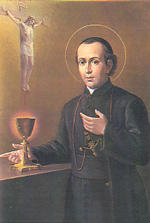Interesting that this Pope who has just presided over the end of the Year of the Eucharist could release his first encyclical on the Feast of Mary's Immaculate Conception (John Bosco Prophecy), of course December 8th is also the 40th anniversary of the end of the Second Vatican Council. The subject of the encyclical:
One' s personal relationship with God
A Spiritual Meditation on Love and the World
Monday, October 24, 2005
Sunday, October 23, 2005
WHAT IS MAN?
From Bishop Kallistos Ware:
Michael Dubruiel 2005
Now there is a specific reason for this mysterious and indefinable character of human personhood. And this reason is given to us by St. Gregory of Nyssa, writing in the fourth century. "God," says he, "is a mystery beyond all understanding." We humans are formed in God’s image. The image should reproduce the characteristics of the archetype, of the original. So if God is beyond understanding, then the human person formed in God’s image is likewise beyond understanding. Precisely because God is a mystery, I too am a mystery.
Now in mentioning the image, we’ve come to the most important factor in our humanness. Who am I? As a human person, I am formed in the image of God. That is the most significant and basic fact about my personhood. We are God’s living icons. Each of us is a created expression of God’s infinite and uncreated self-expression. So this means it is impossible to understand the human person apart from God. Humans cut off from God are no longer authentically human. They are subhuman...
...Self-centeredness is in the end coldness, isolation. It is a desert. It’s no coincidence that in the Lord’s Prayer, the model of prayer that God has given us, and which teaches what we are to be, the word "us" comes five times, the word "our" three times, the word "we" once. But nowhere in the Lord’s Prayer do we find the words "me" or "mine" or "I".
In the beginning of the era of modern philosophy in the early seventeenth century, the philosopher Descartes put forward his famous dictum, "Cogito ergo sum"—"I think therefore I am." And following that model, a great deal of discussion of human personhood since then has centered round the notion of self-awareness, self-consciousness. But the difficulty of that model is that it doesn’t bring in the element of relationship. So instead of saying "Cogito ergo sum—I think therefore I am," ought we not as Christians who believe in the Trinity to say, "Amo ergo sum"—"I love therefore I am"? And still more, ought we not to say, "Amor ergo sum"—"I am loved therefore I am"?
Michael Dubruiel 2005
Now the Greek Alphabet...Tropical Storm Alpha
Looks like it might merge with Hurricane Wilma in the Atlantic...Tropical Depression Alpha
End of The Year of the Eucharist

From Pope Benedict's Angelus Message for Today:
To the most Holy Mary, Eucharistic woman, we entrust the spiritual fruits of the Synod and the Year of the Eucharist. May she be the one to watch over the journey of the church and to teach us to grow in communion with the Lord Jesus to be witnesses of his love, where the secret of joy lies.
Gay Toronto Priest Outs Himself on TV
My guess is we'll find out that he has been removed from ministy..."retired" is often the Church's euphemism for a variety of censures.
From edmontonsun.com - Canada - Gay Toronto priest outs himself on TV:
From edmontonsun.com - Canada - Gay Toronto priest outs himself on TV:
'I'm a Roman Catholic priest and I'm gay.'
With that confession, 63-year-old Karl Clemens became the first priest in Canada to openly declare his homosexuality.
Clemens - a priest for 33 years who retired from the Kingston diocese seven years ago - now lives in Toronto, calling Church Street in the city's gay village his parish.
'I don't have a parish,' Clemens told 360 Vision in a documentary that aired last night on VisionTV. 'My parish is the street - the highways, the byways, the bars.'
Clemens, who wears a priest's collar and says mass every day in his living room, said he is celibate.
Friday, October 21, 2005
Feast of St. Gaspar del Bufalo

Looking for a powerful intercessor? Try this great saint--the founder of the Precious Blood Community.
From the Missionaries of the Precious Blood:
Gaspar began his work by proclaiming "peace through the blood of the cross." He called people to reconciliation - to a restored right relationship with God and with God's people. In order to continue his mission of preaching missions and retreats, he gathered other diocesan priests together to spread the message beyond the city of Rome.
On August 15, 1815, he established the Missionaries of the Precious Blood, in Giano, Italy, where an abandoned monastery was given to the community in order to help it begin the work of proclaiming God's saving love through the precious blood of Jesus. Gaspar continued to bring men together to help build up his small community of preachers. Eventually the community would have both priests and brothers, who worked together to reach out to people who needed to hear some good news.
Gaspar was especially famous for his preaching to the bandits in the small towns of the Papal States. His preaching inspired many to turn away from lives of crime and brought hope to areas heavy with crime.
Gaspar died in Rome, December 28, 1837. He was declared a saint by Pope Pius XII, June 12, 1954. His feast is celebrated in the City of Rome and by members of the Missionaries of the Precious Blood on October 21 - the anniversary of the day he preached to the Archconfraternity of the Precious Blood for the first time.
Subscribe to:
Posts (Atom)